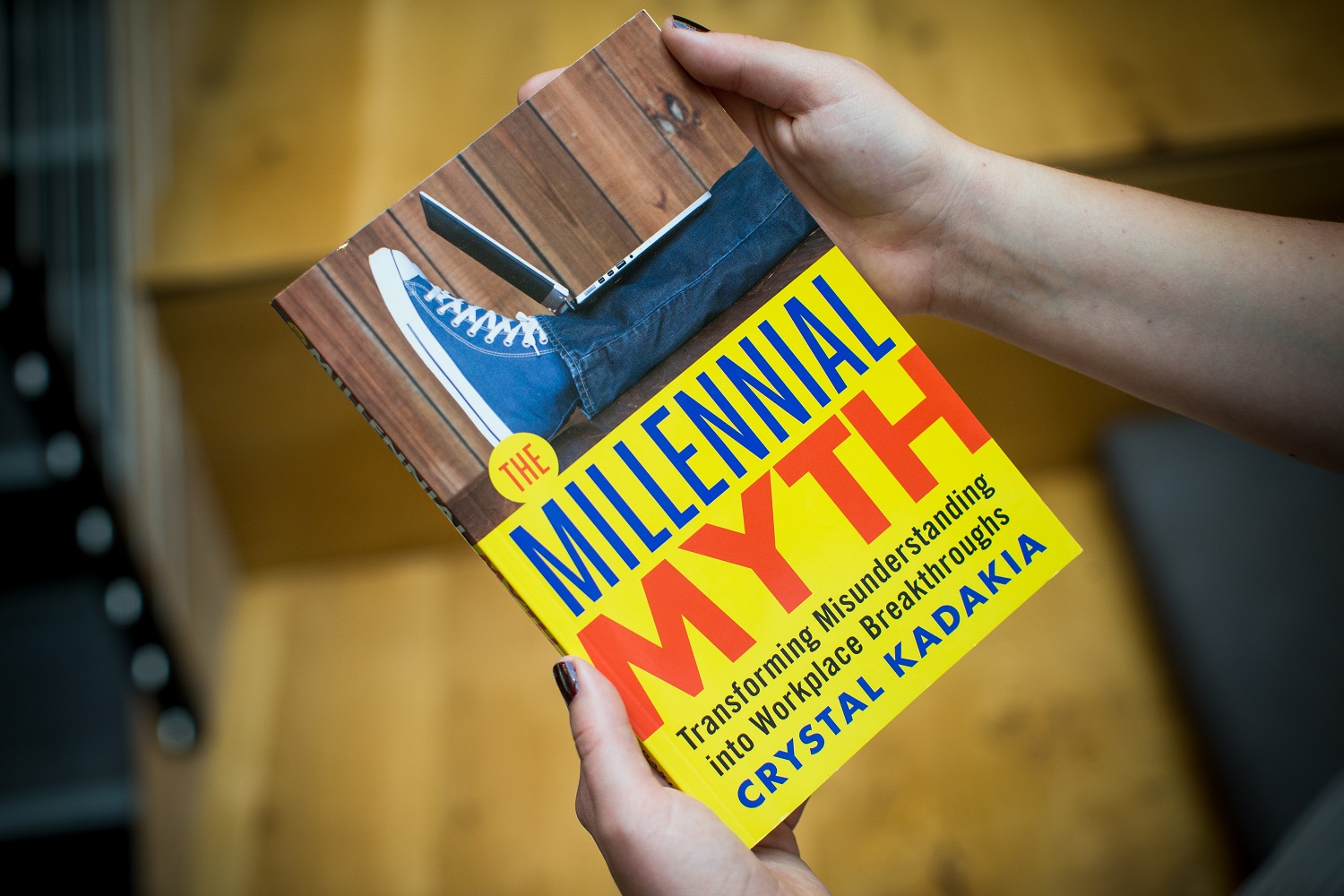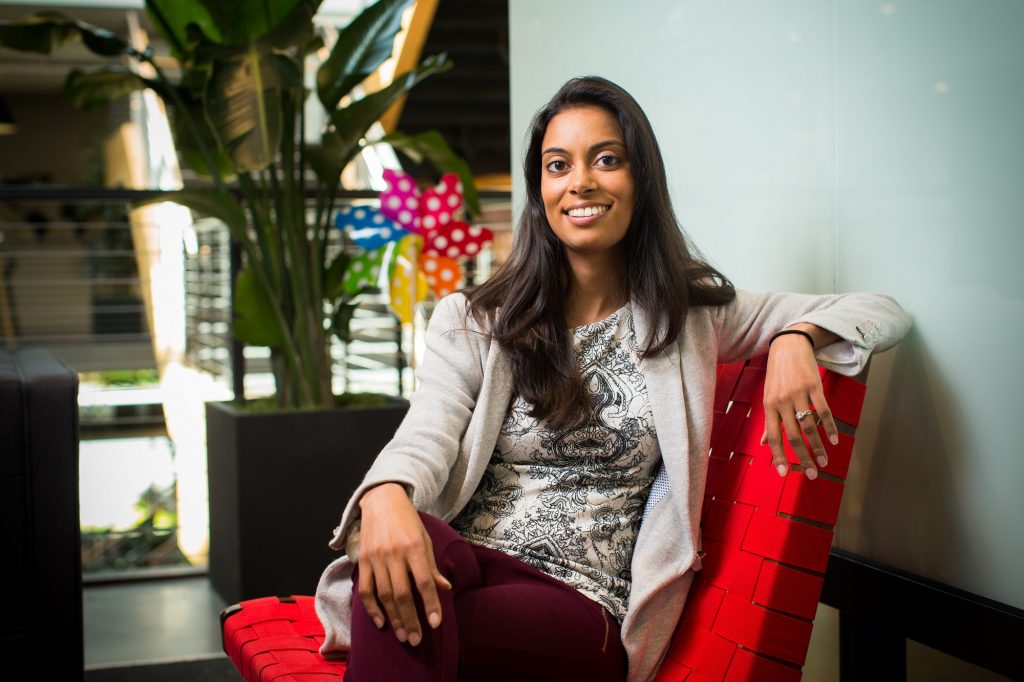Crystal Kadakia converts the myth of ‘lazy, entitled’ millennials into modern workplace strategies
About seven years ago, Crystal Kadakia was a training manager at a Fortune 50 company when she began noticing negative media stories about millennials. She started to see simplistic charts that summed up entire generations – millennials, boomers, Generation X – in a few words. None of it conformed to what she knew.
She decided to start Invati Consulting, an Atlanta-based company that helps organizations adopt modern workplace strategies by better understanding millennials, which for Kadakia means understanding the impact of growing up digital on people’s mindset and habits at work and in life.
A millennial herself, Kadakia has a background in chemical engineering, is a two-time TEDx speaker and wrote the book, “The Millennial Myth: Transforming Misunderstanding into Workplace Breakthroughs.” In her lively talks, she defines millennials as people born between 1980 and 1995. She recently visited Microsoft in Redmond, Washington, and chatted about millennials and modern workplaces in an interview.
TRANSFORM: What are the most common myths or stereotypes about millennials?
KADAKIA: That millennials are lazy. They’re entitled. They’re the “trophy generation,” which means they expect to have awards for doing nothing or for just showing up. They’re disloyal and they have issues with hierarchy. These stereotypes and myths are only one aspect of a fuller story.
 TRANSFORM: Where do the myths come from and why are they so negative?
TRANSFORM: Where do the myths come from and why are they so negative?
KADAKIA: Every generation has complained about the previous generation. When the telephone was invented, there was definitely a grandmother complaining about kids using the weird black box on the wall and being lazy, instead of walking a mile down the road to physically call on a neighbor.
This is something we naturally do as humans. While complaining isn’t new, what is new is the rate of innovation in the last three decades and the emergence of social media.
The fast pace of innovation in the last 30 years has meant an even bigger gap in how we approach work and life between generations. Social media has created a viral platform to circulate and reinforce the complaints.
TRANSFORM: Where does the stereotype that millennials don’t respect hierarchy come from?
KADAKIA: The stereotype is that millennials often skirt hierarchical lines and treat their boss like their best friend. I’ve heard horror stories where a millennial doesn’t like an answer from a manager and will ask the director the same question, with no regard for how that might be perceived.
That comes from growing up with the internet, where people are relatively anonymous. When you are anonymous, you can gain a following and have an opportunity to contribute your perspective without hierarchy, without having climbed up a ladder. It’s not as much about your age, tenure, gender or ethnicity. It’s more about your voice, and if it’s compelling, it can move you up the “virtual hierarchy.”
TRANSFORM: How can that behavior benefit organizations?
In the past, organizations have said, “It’s so hard to get frontline perspective and how do we make sure our leaders are connected? How do we create cross-functional connection?”
The cool thing about digital technology is that it can enable those connections, and you’ve got millennials and Generation Z – the generation after millennials – who don’t hesitate to create a bond or share an idea across traditional boundaries.
TRANSFORM: How else has digital technology shaped millennial behavior?

KADAKIA: Digital technology provides us with more information than ever on what’s possible, what we could be doing, what others are doing. There’s a lot around how we process and decide between choices. There’s also a presence of anxiety.
It’s constantly facing the question: I know I can be anywhere, so where exactly do I want to be? If I can choose amongst all these different options, what am I going to choose? In the past, generations had to manage from a mindset of scarcity. In this world of digital, we’re starting to deal with an “abundance mindset” that has its own challenges.
TRANSFORM: Is that anxiety related to “YOLO vs. FOMO”? (Kadakia covers the topic in her talks).
KADAKIA: YOLO is “You only live once.” FOMO is “fear of missing out.” When you look at psychology and sociology, there’s a very clear understanding that humans are motivated to take action to avoid pain or to seek pleasure.
For digitally enabled generations, I describe the pain vs. pleasure concept by saying the pleasure is YOLO. It’s: “I’ve got all these cool choices and experiences I can pursue. I’m seeing somebody can be a photo blogger in Hawaii and make a living, so I want to do that.” The positive of that is that it causes us to seek experiences and growth, and create a learning mindset.
Avoiding pain is FOMO. We have all these different choices. We want to say yes to everything and often have a hard time making a commitment.
TRANSFORM: How does YOLO vs. FOMO show up in the workplace?
KADAKIA: One of the most common places is in career development discussions. Older-generation managers often feel perplexed by a younger talent’s desire to get promoted soon, avoid routine duties and have access to leadership. They often perceive millennials as entitled, because millennials ask for these things early, without having put in the time.
But millennials have always had exposure to choices and information, and have a desire to make the most of their potential. With YOLO vs. FOMO, it’s the idea: How can I maximize my every day? Millennials are often able to wear multiple hats and start their own side hustles, and they have a greater entrepreneurial spirit.
Managers can help push employees to consider their “why,” because understanding intentionality can effectively navigate the YOLO vs. FOMO anxiety/drive/passion.
TRANSFORM: What’s an example of the “one coin, two sides” model you use in your book?

KADAKIA: A really easy example is the stereotype of millennial laziness. When you think about work a hundred years ago, it was mass manufacturing, when people worked 14 hours. That was very clearly hard work.
If you’re a boomer with parents who grew up during the Great Depression, you’ve got a certain idea of hard work. That’s one side of the coin. If you’re a millennial and grew up in a world of digital devices, you have a different idea of hard work.
For millennials, it’s: “I have a laptop and can work anywhere, anytime. I do cognitive work not in a manufacturing plant, and I know when I need to take a break, so I can come back and think critically again.” It’s redefining productivity.
TRANSFORM: How can organizations transform millennial myths into modern workplace strategies?
KADAKIA: You need to acknowledge that the myths and perceptions exist. There’s very respectful ways you can do it. You can say, “Look, there’s grains of truth in these complaints or stereotypes, but there’s more to it than that.”
The second thing is to recognize that a lot of millennial behaviors stem from growing up with digital. If you want to include millennials in your organizations and transform into a thriving, modern organization, you’ve got to start studying what digital behavior is doing to all of us.
TRANSFORM: Why is it important for organizations to better understand millennials?
KADAKIA: They are the entire future workforce. I’m imagining myself 40 years from now. Do I want to hold on to how I’ve always done things and have my practices become irrelevant the moment I step out of the workforce? Or do I want to be help shape the future and witness the seed of my work flourish?
TRANSFORM: What’s next for you?
KADAKIA: I’m getting my master’s degree in organizational development, which is about helping organizations change. It’s a good foundation for what I want to continue doing and do more of in the future, which is helping leaders develop a strategy that maximizes the positives of digital behavior and minimizes the risks or negative impacts they’re seeing.
I’m also really excited about how organizations are creating learning cultures and innovation cultures, specifically how greater diversity is contributing to innovation and in some cases driving innovation. The manager and leadership development piece is also always going to be something that interests me.
The other thing I’m pursuing is the global aspect of digital technology and how other countries and cultures have adopted it, and looking at what’s good, what’s not so good and sharing those lessons.
To contact Kadakia and learn more, go to her LinkedIn page.
Top image: Crystal Kadakia. Photos by Dan DeLong.








